This is probably the most open Tour de France since 2012 with a long list of contenders and pretenders. This much we know, picking a winner for Paris is at best test of epistemology and more truthfully exercise in story telling. Which rider seems the most convincing?
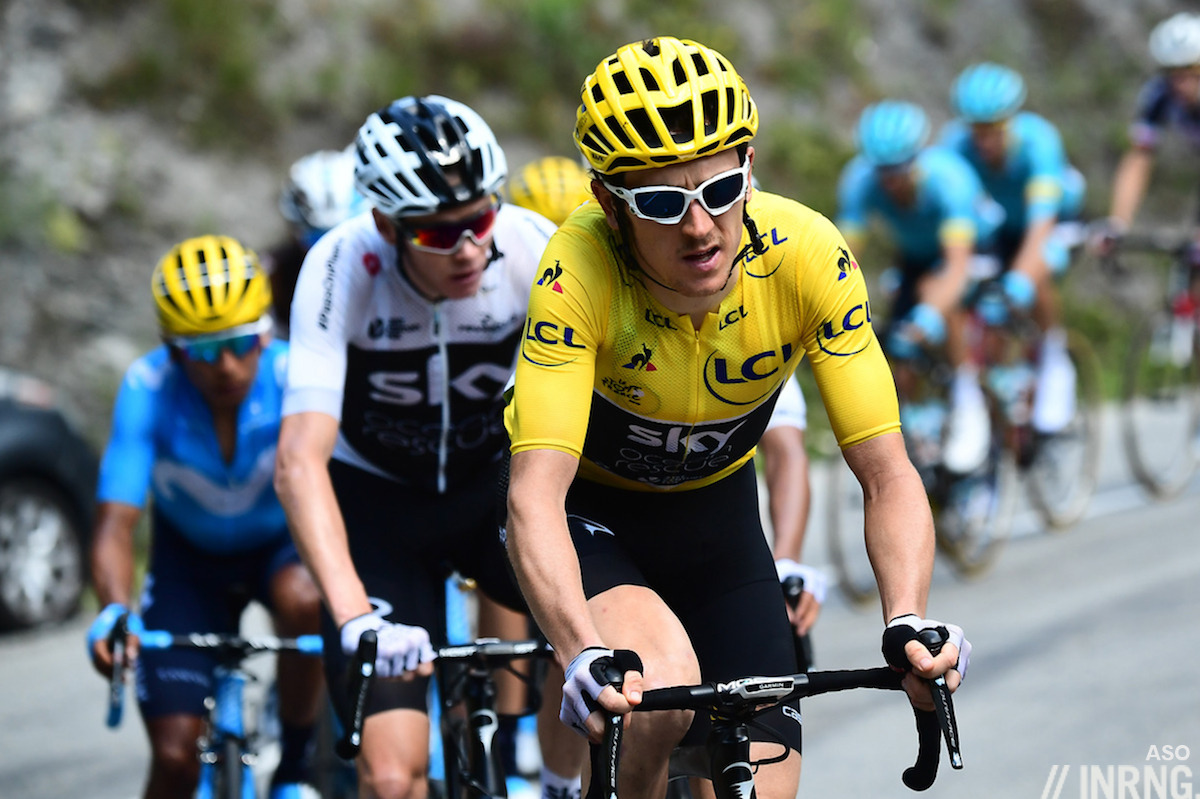
To predict the future, best see what happened last time. Geraint Thomas (Team Ineos) won in 2018 and it was an assured ride, he took summit finishes and was also lucky too, runner-up Tom Dumoulin’s broken wheel on the stage to Mûr-de-Bretagne cost the Dutchman two thirds of his deficit forcing him to gamble and lose more time. Last year Thomas had a perfect path to the Tour, 2019 doesn’t bring the same assurance or luck, this year Thomas has been out of sorts and on the ground. There’s not much to go on, third overall in Romandie suggests he’s on track but we just don’t know any more as he crashed out of the Tour de Suisse which means his form is the big question. He has a strong team with Wout Poels and Michał Kwiatkowski as key men, they can control the race and even hold a psychological grip on rival outfits, plus Thomas has the power and race craft to take time bonuses.
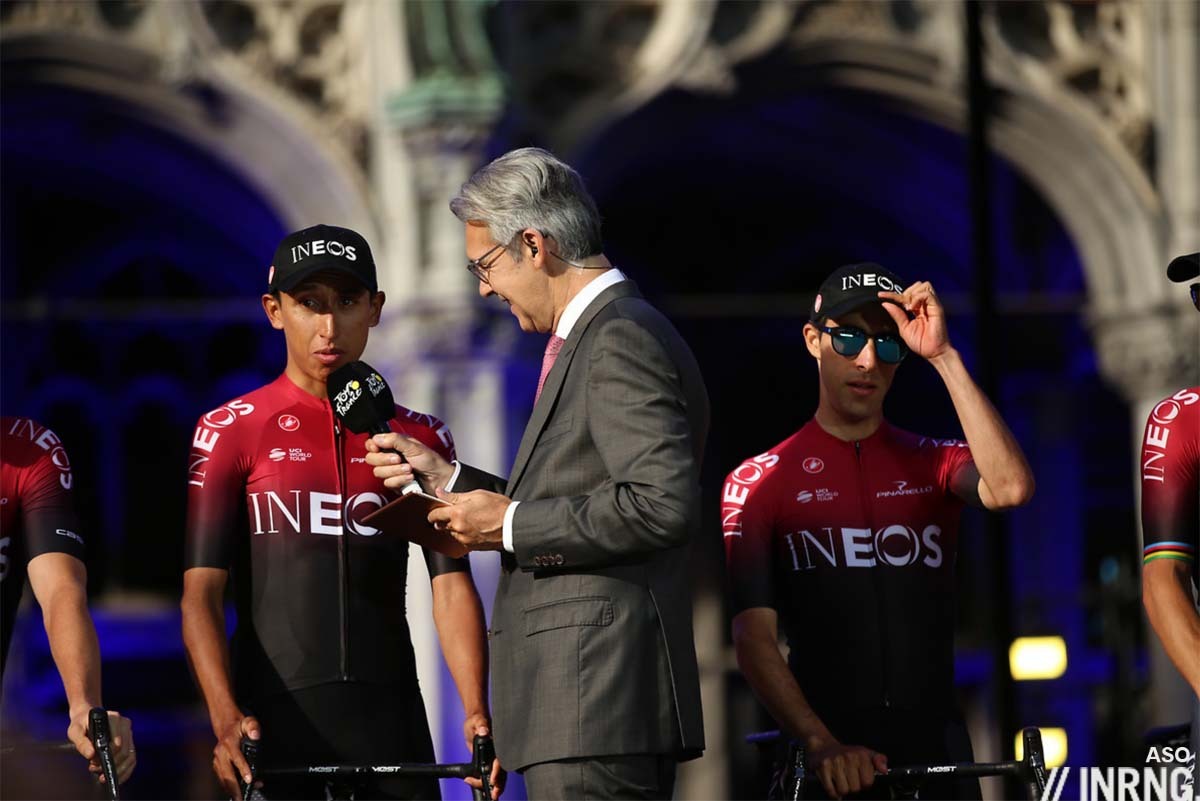
Egan Bernal is the co-leader at Ineos but the road will decide and the Planche des Belles Filles on Stage 6 could deliver internal promotions and demotions. Bernal could be the first Colombian to win the Tour de France, but forget the stereotype escarabajo climber, he’s much more complete. He first impressed at Androni for his race craft and positioning and he thrived in the wild crosswind stage of Paris-Nice, the foundation for his win in March. He’s competent in a time trial, descends well and spent his childhood as a mountain biker which gives him reflexes to help save a tricky situation although in a short career he’s already had some long breaks following crashes. He’s just won the Tour de Suisse which ought to reassure but his win was steady rather than flamboyant, the field wasn’t galactic so we’re left in anticipation of what he’ll do in the Tour’s mountain stages against stronger opposition. We know he can handle a three weeks of racing, he got Chris Froome on the podium last year by towing him across the top of the Col d’Aubisque on the final mountain stage so the only untested element is watching him defend the yellow jersey but the team does plenty of this. Of all the riders he seems the most complete even if he’s still 22. And if he doesn’t win this year he will some day.
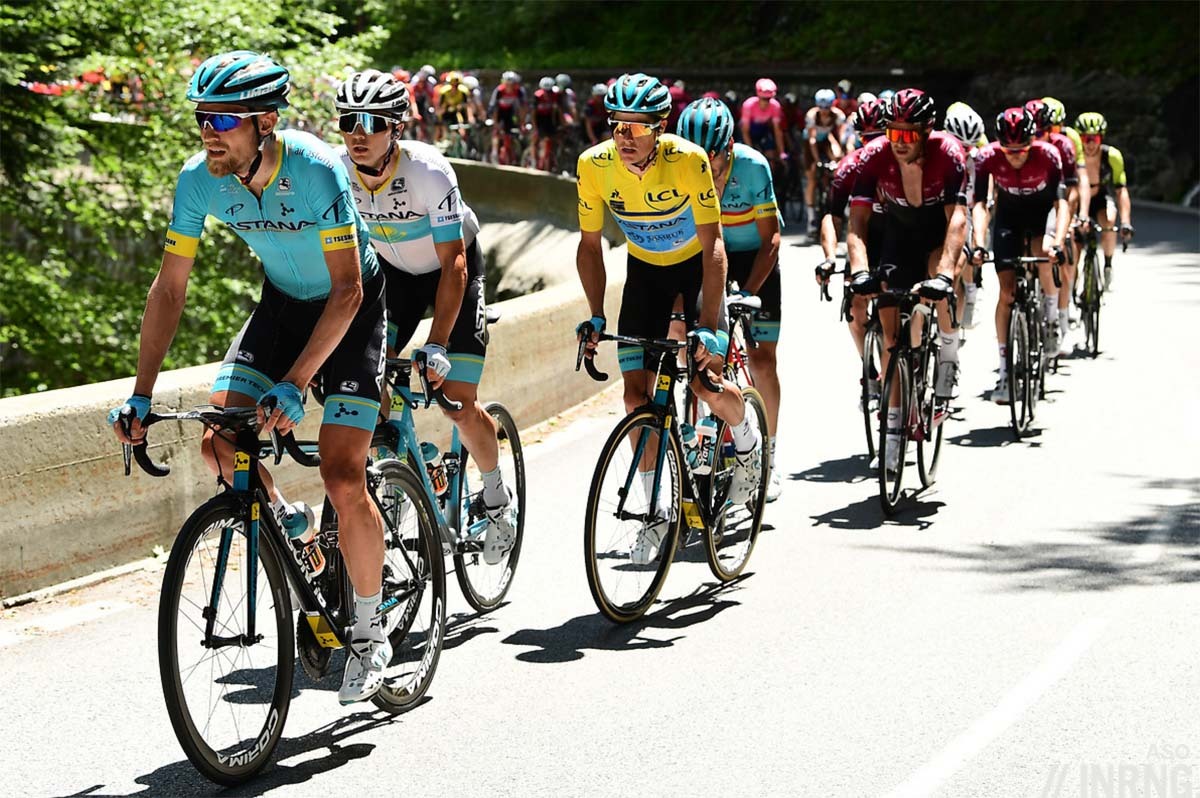
Jacob Fuglsang is having his best ever season and Astana have been dominant in many stage races but he and they would surely swap it all for a win this July. Fuglsang’s the form rider but there are still questions, he won the Critérium du Dauphiné but there were no high altitude climbs although in mitigation the climb to Pipay started low, so he can handle long ascensions as well as the short ones on the way to winning Liège-Bastogne-Liège. Next is whether he can piece it all together for three weeks – he’s never finished better than seventh in a grand tour. Finally does he want to win? We’d all like to win but imagine he’s third overall going into the final three mountain stages, would he risk it all for a shot at the win or defend his position which would mark a career achievement? Astana bring a formidable team with riders capable of stage hunting and acting as relays for breakaways.
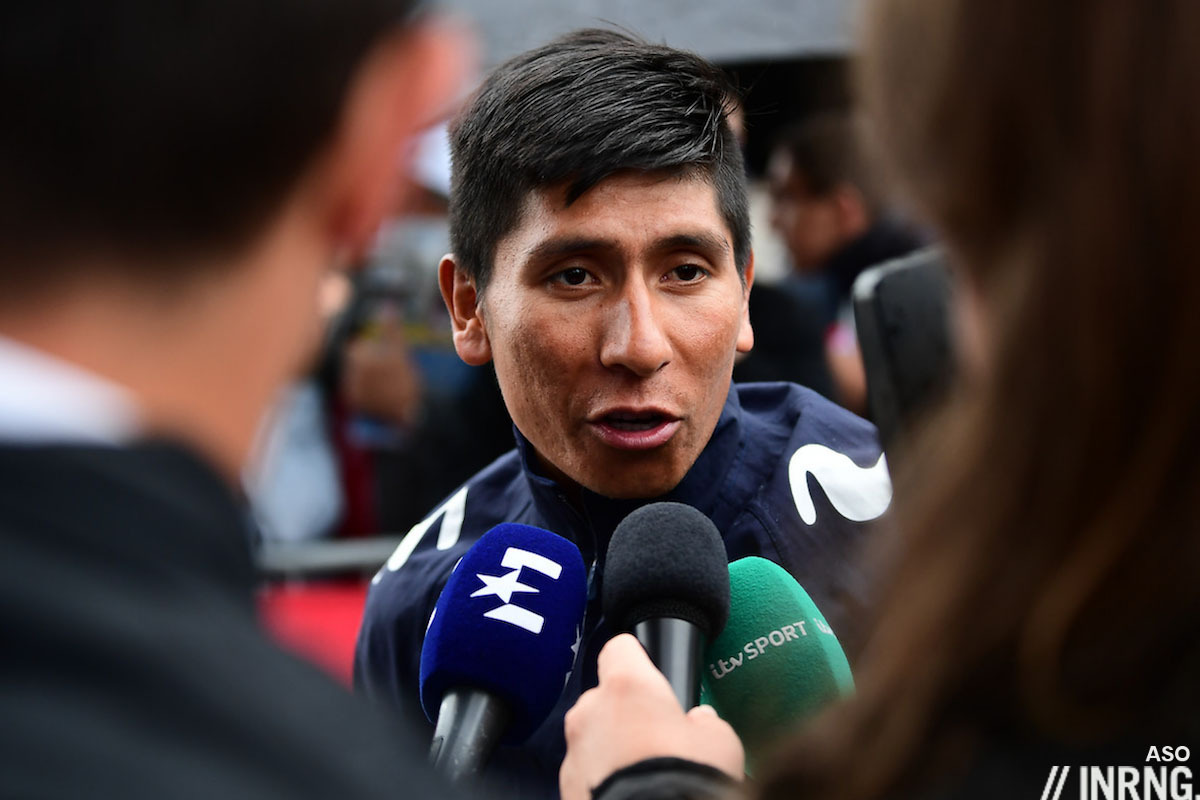
Movistar return with their trident of Nairo Quintana, Alejandro Valverde and Mikel Landa. Last year’s El Tridente was more gardening fork than gladiator. Quintana is Movistar’s leader and the course suits him, he’s at his best on the very long climbs where he doesn’t ambush rivals, he grinds them down but he’s turned stale in recent seasons and this is a crunch Tour. His form’s unknown, he had a decent Dauphiné but the race didn’t give up many clues. As for Valverde, many long for a change of script from the Sky years but what if he won? He’s in form having breezed the Route d’Occitanie and Spanish national championships but as ever the question for him is holding it together for three weeks and coping with altitude. Landa had a good Giro in his legs but this means fatigue here although he says he feels great and here’s a course to suit with few time trials and muchas montañas. As well as the three prongs the shaft of the team is strong and capable of unpicking Ineos but Movistar are often conservative rather than inventive.
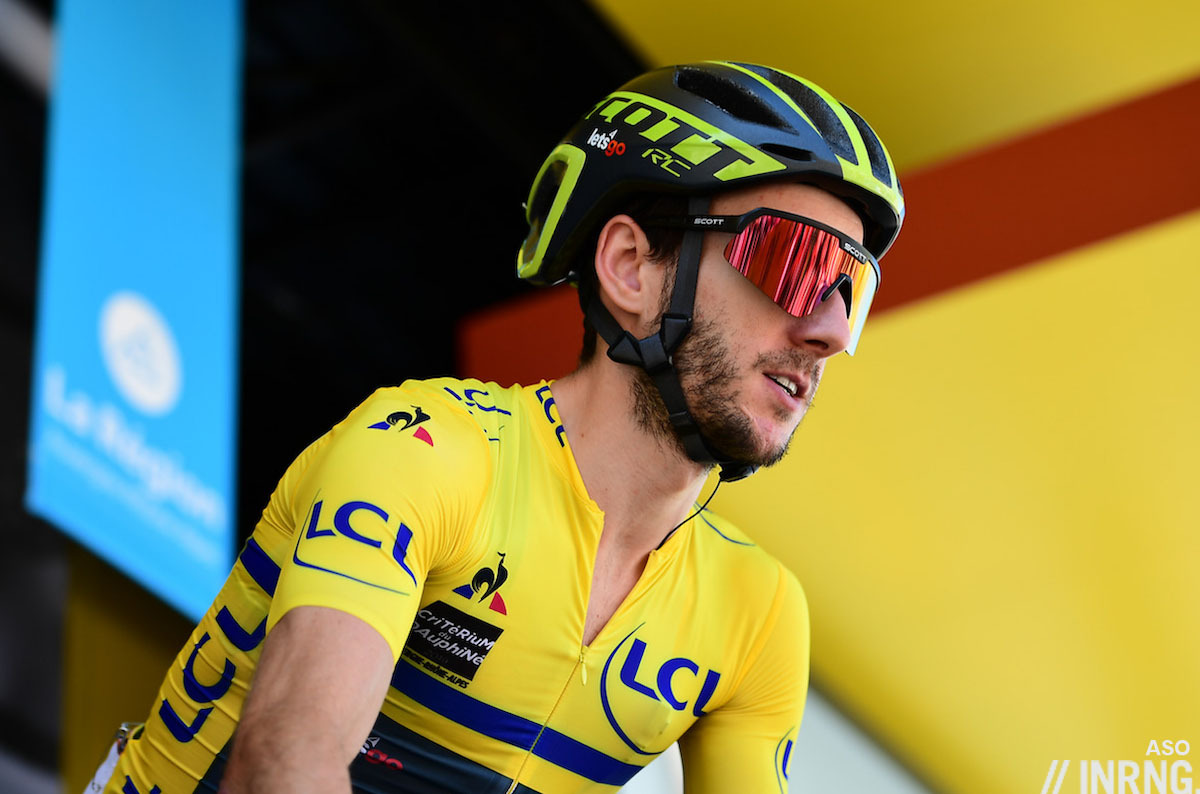
Adam Yates leads Mitchelton-Scott and has been targeting the Tour all season. On his day he can climb with the best and as we saw in the Dauphiné’s time trial he’s effective for someone weighing less than 60kg and this got him in the yellow jersey. The form is there, the course suits and he’s handy in a sprint among climbers for time bonuses. He’s even beaten Egan Bernal in a summit finish this year, in Catalunya. The team are strong with Jack Haig as solid support and Simon Yates a surprise starter, a possible contender too but more likely to be saved for the big days just as they did with Adam in the Vuelta last year.
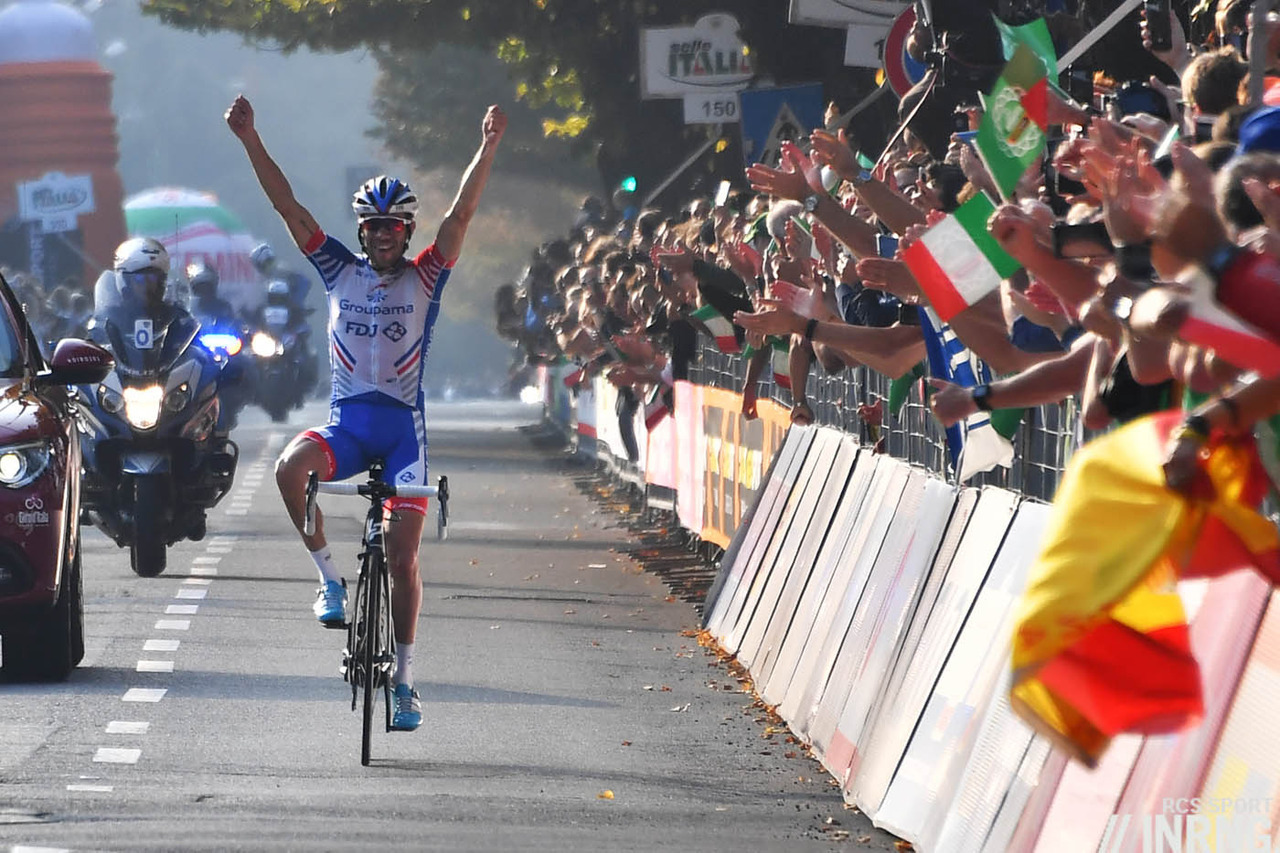
Thibaut Pinot‘s recovery from the Giro last year to win stages in the Vuelta and then sack Nibali on home soil to take Il Lombardia show he’s gone up a level, he can drop rivals à la pédale. Groupama-FDJ bring a solid team that should limit the losses in Sunday’s team time trial. But last year’s Giro and Vuelta showed us his twin problems: his immune system as he seems prone to illness and concentration as he can end up on the wrong side of a split in the bunch and he’s got to cope with the media burden too, if the Tour is a pressure cooker at the best of times spare a thought for Pinot, an introvert whose idea of a good time is tending to his flock of sheep and goats back home rather than doing daily TV interviews. David Gaudu should accompany him in the mountains but consistency is his challenge and the team are not in a rush to demand a result from him.
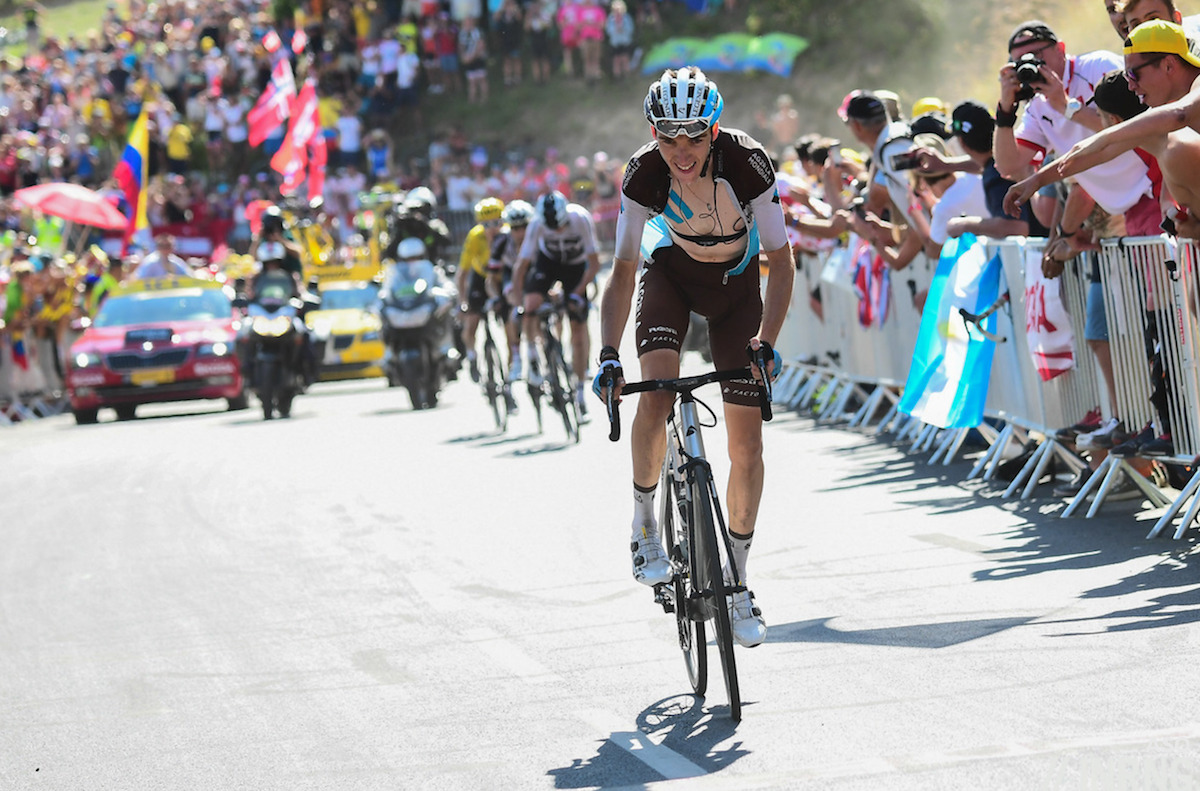
Romain Bardet (Ag2r La Mondiale) has been on the podium twice and is a top-10 regular. A win is still possible but he needs everything to go right every day. So far the signs aren’t promising with a Dauphiné were he was a touch off the pace although he’s had training camps in the Alps to turn things around. His brown short brigade have been up against it, Pierre Latour would have been a big help but is short of form after a broken wrist this spring meaning Giro finisher Alexis Vuillermoz is drafted in, while Tony Gallopin and Benoît Cosnefroy both crashed in the French nationals last week and start sore. Still the team are good, at least for the mountains rather than the TTT and Oliver Naesen an invaluable bodyguard for other days. Bardet even enjoys a visit on Bastille Day to Brioude where he grew up, a factor which convinced him to ride as he’d been tempted by the Giro for a change.
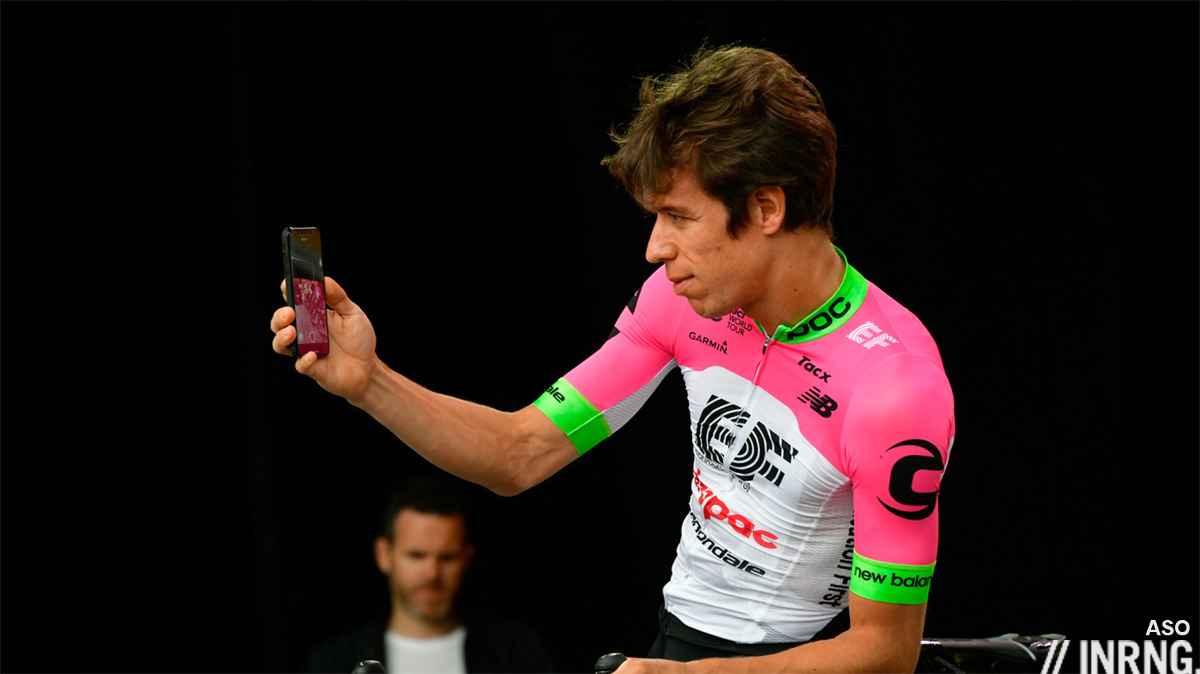
Rigoberto Urán is a central figure in Colombian cycling, while Bernal is the newcomer and Quintana the superstar, “Rigo” has his place too, whether at first as a landlord to the likes of Quintana and now with politicians in his contacts. He was second in 2017, he never looked like winning yet this remains his masterpiece ride because he was consistently good and reliable. Just like 2017, he’s used the Route d’Occitanie as a tune-up and just like then he had a good ride and is apparently hitting the same numbers. Unlike before, the EF Education First team lhere ooks stronger with Tejay van Garderen appearing relaxed these days and he finished second in the Critérium du Dauphiné while Michael Woods is stage-hunting but helpful to have if there’s a position to defend. The long climbs suit Urán and his team are contenders for the TTT too.
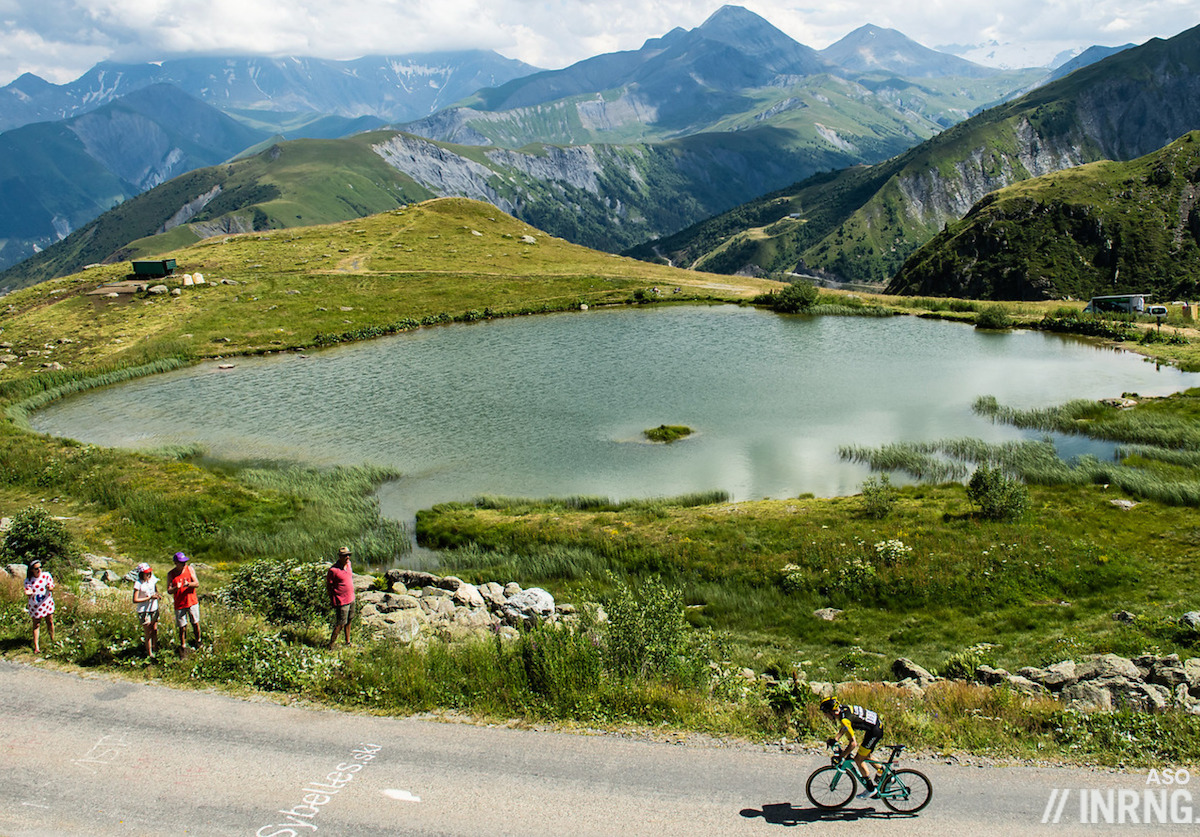
Steven Kruijswijk’s raid on the stage to Alpe d’Huez last year was one of the best rides of the season for its audacity, he was sitting sixth overall but took off in the early break. Only the team could play the double act then because Primož Roglič was riding too. This time “The Coathanger” is Jumbo-Visma’s sole leader for the overall classification, with George Bennett on a support role for now. He’s got a low win rate but is a strong rider who copes well with altitude so the course suits. He had a decent Dauphiné and if he was DNF it was only a short-term stomach bug. But how to win? It’s easy to see him being consistent and riding high on GC, even the podium, but hard to imagine him dancing away from all the names above on a summit finish and winning outright so it’ll be interesting to see what the team have up their sleeve, or, to use a Dutch phrase, how “the monkey comes out of the sleeve”.
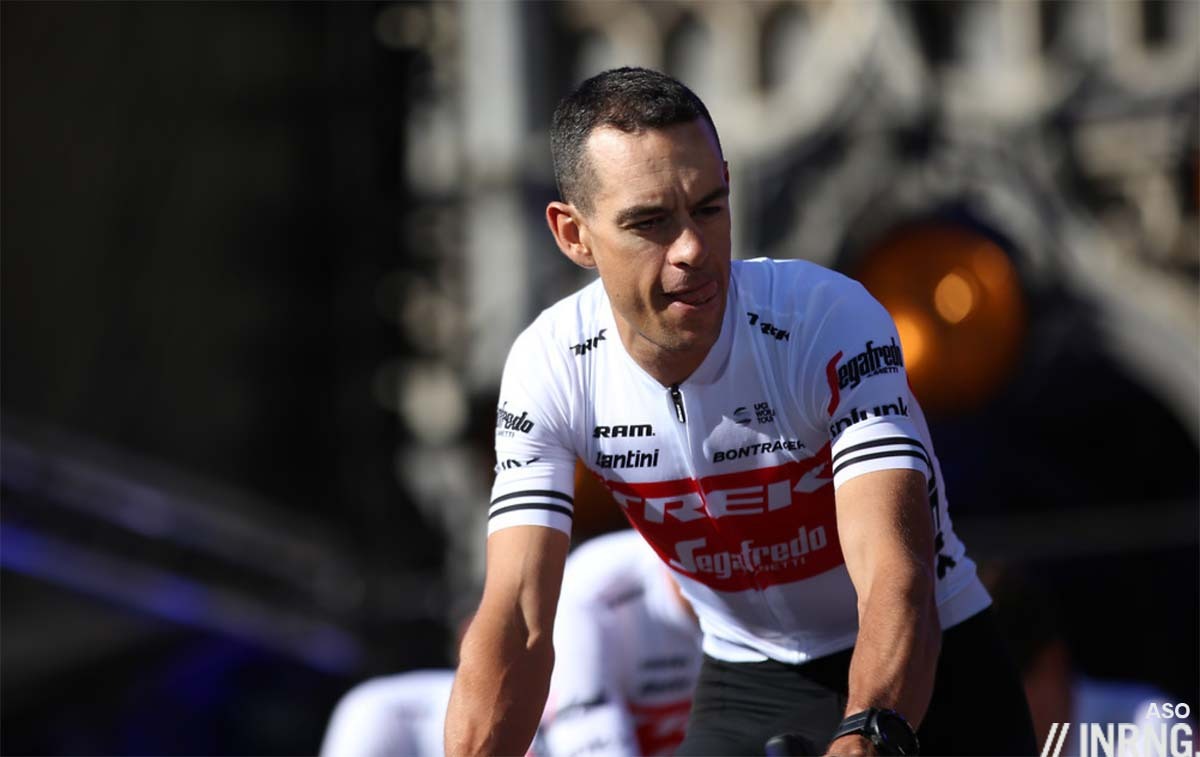
Sport’s a fickle business and for several years running Richie Porte has been a genuine contender for the Tour podium, now he’s hardly in the headlines. He’s changed teams and comes with a Trek-Segafredo team built around him with Bauke Mollema drafted in for support rather than saved for the Vuelta. Normally he excels in short stage races but, apart from his habitual Willunga win, this year has been lacklustre thanks to illness. In his own words he’s “coming in underdone” when normally he’d be sizzling but what if he’s in peak form this July and stays lucky?
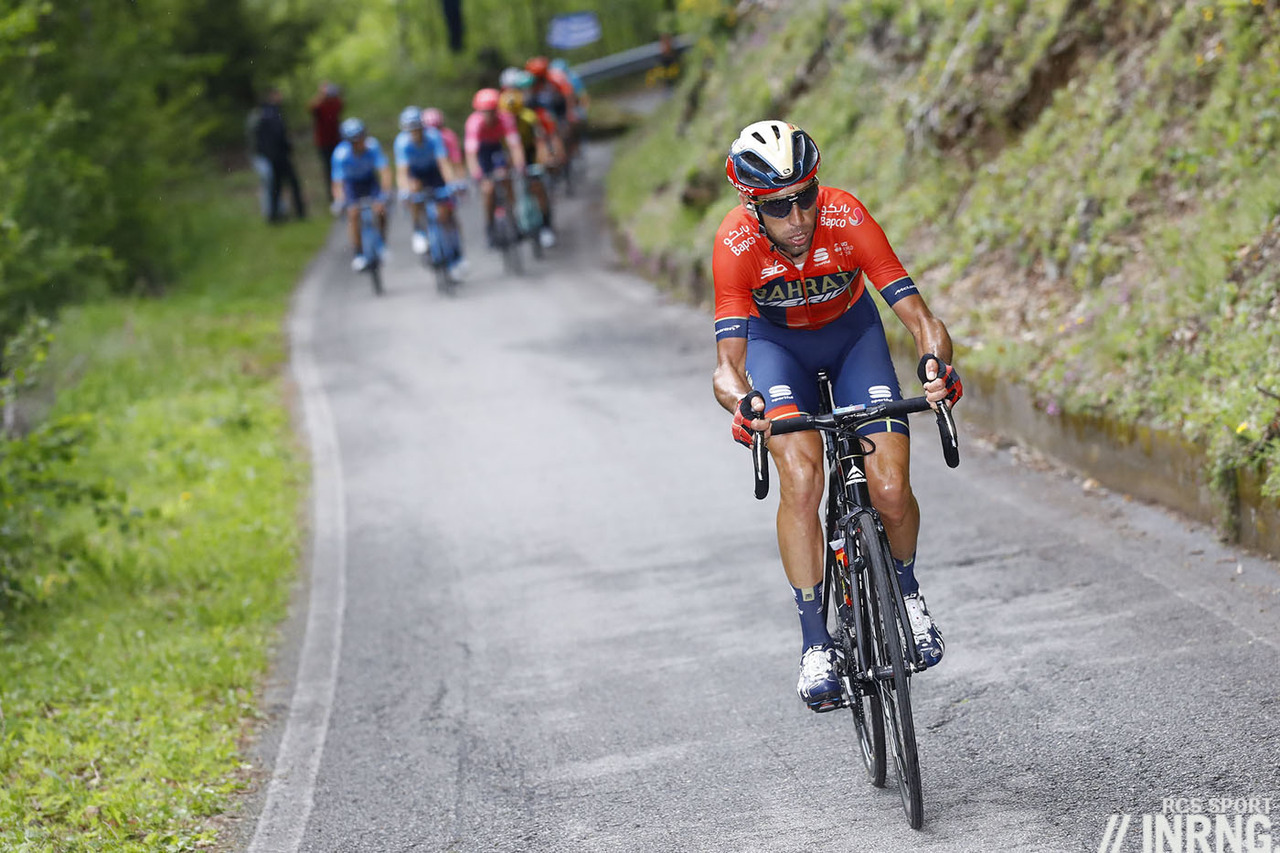
Vincenzo Nibali is the only other rider in the race to have won it after Thomas but is an unknown quantity. The Giro was his big target and he finished a creditable second overall, now he starts with no pressure but the fatigue of the Giro in his legs and talk of the polka dot jersey or a stage win if the daily challenge for the overall isn’t possible. The absence of Froome and Dumoulin has boosted his interest and altered his training plans and the first goal is the GC but how to win, it’s hard to see him taking summit finishes. Bahrain-Merida bring a strong team including Damiano Caruso who was a precious help in the Giro but others on the team look good for stage wins.
Finally some more names. L’Equipe ran a front page saying “now or never” for Bardet and Pinot but they have time on their side while Dan Martin (UAE Emirates) is probably in more of a hurry as he turns 33 soon and this course is ideal, he could make the podium and bag a stage but struggles in the time trials. Enric Mas (Deceuninck-Quickstep) had a great Vuelta but had a modest Tour de Suisse and hopefully he’ll improve but it’s hard to see the win. Emanuel Buchmann (Bora-Hansgrohe) keeps improving and hasn’t finished lower than seventh in a stage race this year and should be one to watch in the mountains but a win against this competition seems a big ask, a top-10 is very achievable and team mate Patrick Konrad is getting better too.
| Egan Bernal | |
| Jacob Fuglsang | |
| Geraint Thomas, Nairo Quintana, Thibaut Pinot, Adam Yates | |
| Rigoberto Urán, Romain Bardet, Vincenzo Nibali, Mikel Landa | |
| Porte, Valverde, Kruijswijk, S Yates, Gaudu, van Garderen, D Martin |
- Comment: Bernal gets five chainrings thanks to his Paris-Nice and Suisse wins and the course suits him while Thomas’s unknown form makes it hard to give him more than three chainrings right now, he himself is talking about riding into the third week as if things aren’t quite there today. Fuglsang’s a brittle pick but his Dauphiné win was impressive in its consistency, he didn’t luck out but took time where it was needed. The best scenario would be to rewrite all of the above several times over during the next three weeks…
More info on the route, rules and more at inrng.com/tour and there will be daily stage previews every morning

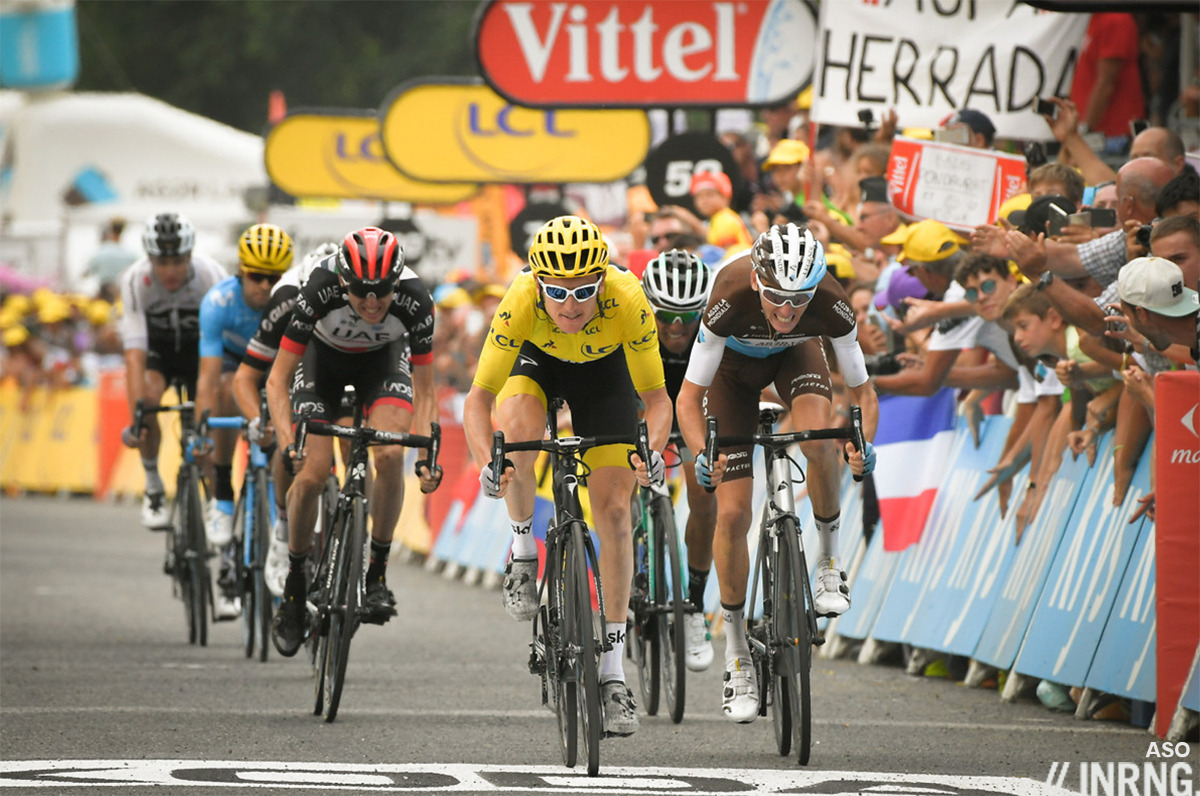
Fair play for going all in. I agree Bernal is probably favourite but 5 chainrings is possibly 1 too many. I’d say only Froome is a 5 chainring favourite for any Grand Tour. Or was.
I hesitated with the five chainrings and was tempted to leave it blank but spreading all those names across four would have made it too concentrated, Bernal is the best pick but far from the Froome-like certainty of the past.
For sure, Bernal is the only one who sticks out. Anything can happen if he crashes on the first week. I’d say we should pay attention on Pinot and Quintana. Both have been under the radar but delivered good results this year. Quintana was dropped on the longest climb of Dauphine, yes, but he was always near the top 10, day after day. And he attacked on that climb. Pinot won tour of Alps, against a weak field, ok, but he was climbing with good numbers. I think we may have a memorable tour ahead of us
I think Bernal will win – because he has the best domestiques (and that’s why I also think it’ll be dull to watch), and because Thomas seems to have taken the inexplicable decision to get unfit over the winter (Did he succumb to the British disease of drinking yourself senseless for a few weeks/months after winning something? Did he think he had no chance if Froome was not doing the Giro and so didn’t put in the requisite effort? I don’t know).
If Ineos were confident Thomas was a favourite they’d back him solely: either they don’t think he’s got good form or they don’t think he’s good enough a grand tour rider to be their only leader.
Other teams may have looked strong so far this season, but when it comes to TdF time suddenly Ineos/Sky riders are superior to all others. Doesn’t matter what a rider’s history is like, once they join this team they become super-domestiques – has Castroviejo ever climbed like he did in 2018? (Watch how Dylan van Baarle climbs this year.)
And this is why a team time trial is a bad idea: it gives stronger teams that much more of an advantage. Riders on weaker teams will easily lose a minute without the riders on the stronger team having had to make much individual effort. It’s a team sport, but a TTT puts too much emphasis on team strength; and this team strength already affects every other aspect of the race.
Bernal’s tactical inexperience shouldn’t be much of a handicap, as he’ll be told precisely where and when to go – the joy of radio-based racing.
There isn’t a single rider apart from Bernal who I look at without seeing a major flaw in their ability to win this race.
Kruijswijk, Martin, Urán, Yates: probably not good enough.
Valverde (whilst also being poor this season) hasn’t won a GT in 10 years and hasn’t looked like winning one for a long time. He also can’t handle high altitudes.
Nibali also doesn’t strike one as likely to win a GT again – unless he’d focused on this year’s Vuelta perhaps. And certainly not having done the Giro.
van Garderen: not in a million attempts.
I’d say this is Porte’s and Quintana’s best chance of ever winning the TdF (well, Quintana’s was 2015, but Movistar were more focused on making sure Valverde came 3rd). Pinot and Bardet, I can’t ever see winning. Porte and Quintana are good enough if they’re at the peak of their career form (i.e. probably not), whereas Pinot and Bardet have never looked like they could win it. By next year the up and coming riders will have up and come.
Fuglsang is third favourite with the bookies. He had a great classics season, but that seems ridiculous: he’s 34 and he’s had one top ten in a grand tour. He’s never shown that he has the legs for the biggest mountains. One might have said the same of Thomas, but he’s very much an exception and, unlike Thomas prior to last year, Fuglsang has been a GC leader on numerous occasions. (Similarly, I’ve seen people tipping Alaphilippe, who is a significantly worse climber than Fuglsang.)
(There will be interesting stages, etc., but I don’t know how anyone can be hopeful about the GC race considering what we’ve seen for the last 7 years.)
Landa would be my dark horse: he was strong as any rider in the Giro, he seems to do well at two GTs in a row and Quintana could easily lose a bundle of time on an early flat stage if there are crosswinds or whatever, leaving the way open for Landa to become team leader.
Quintana May lose some time on the flat but Landa definitely will, somewhere, somehow. Probably without us even noticing. The first we’ll see of Landa will be him looking rock solid at Planche des Belle Filles. But by then he’ll have contrived to be 5 minutes down on GC and at least a minute to both of Quintana and Valverde.
He needs to list that five minutes to be solid.
(My original post was unintentionally anonymous.)
Richard S, I agree: it could at least as equally happen to Landa as Quintana.
Tovarishch, ‘media demands’ are not actual demands. You can turn them down and focus on training (if the team insist, you say ‘no’ – look at the people who won multiple grand tours). As for the heavy drinking, I don’t know if he did that, but he has a history: there are so many quotes from him about alcohol.
As for Brits, we have such a massive binge-drinking culture (as almost all my non-British friends remark on once they move here). In sport I can think of countless examples: Cavendish criticising Wiggins for drinking heavily after he won gold in Beijing, ruining their chances in the madison a few days later, Flintoff incoherent after winning the cricket Ashes, Manchester United’s chronic alcoholism problems during the Bryan Robson captaincy era, which prevented them from being more successful…
Michael B, week-long stage races don’t compare to grand tours – have you ever seen Castroviejo ride so consistently, and so far, up mountains like that in a GT?
And he was only an example, as, Anonymous, was van Baarle (and you can go back to riders’ junior days and see them being competitive in very different types of races than they do once they’re pro’s).
The general point is that we’ve seen multiple domestiques join Ineos (Sky) and become much better in the mountains. (NB: I’m not claiming I know how or why that happens, I’m just saying it happens.)
The list of booze hound British sportsmen is more or less endless. To your list you could add nearly any Scottish footballer pre 1990, Gazza, Ian Botham, George Best, Arsenal pre Wenger… Wiggins and Thomas are only unusual in that they are cyclists.
I think you are being a bit unfair to Thomas (and Brits, in general, there). The media demands after winning the Tour are huge, more so than for Froome just becauseof Thomas’s personality. He probably didn’t have time to get on a bike even if he wanted to.
I don’t think Anonymous was being too unfair to Thomas who did seem to go a bit “Wiggo” about the fact he had won one Tour de France, bringing out a book and having stadium appearances booked in soon after like it was some sort of talent show. Certainly, this was an observation amongst some and it showed in that he seemed slow to get back into the swing of things this season. After Wiggins won he seemed to give up and run out of challenges as if, after one win, he had achieved all he cared about. One wonders if Thomas is the same.
winning one tour de france is a pretty big deal, most riders would bite your hand off to have that on their palmares. wiggins went on to win olympic gold, have a crack at the giro (that admittedly fell apart), win the world TT and break the hour record – not exactly giving up racing.
When it comes to road racing, I’d say he did give up. In the moment of his greatest triumph Sky decided to prefer Froome thereafter. The Giro 2013 was an afterthought and a disaster as a consequence.
Wiggins’ road palmares post-2012 is really impressive. he never had another good grand tour (he only entered one, 2013 giro, I think), but had numerous successful TTs and won some overalls (tour of britain springs to mind), as well as a decent crack at paris-roubaix one year. that’s to say nothing of his olympic track success. he’s a marmite character (in fact, probably more dislike him than love him), but you can’t really say he ‘gave up’ on road.
That you say he “won TTs” and the Tour of Britain – don’t also forget the Tour of California – kinda makes my point not yours. He was a GC rider aiming to contend for grand tours and after 2012 he never did again. He became a spare wheel collecting others thing rather than becoming the 7 times grand tour winner Chris Froome will soon be confirmed to be. That’s my point. Marmite has nothing to do with it.
“Doesn’t matter what a rider’s history is like, once they join this team they become super-domestiques – has Castroviejo ever climbed like he did in 2018?”
In 2017 riding for Movistar he finished 7th at Tirreno-Adriatico behind Quintana, Pinot, Thomas, Dumoulin, but ahead of Uran, Mollema and Pozzovivo. So the answer is, yes, he climbed in 2018 as well as he did in 2017…
You should have watched how Dylan climbed in Tour de l’Avenir back in 2013. I mean he couldn’t finish overall ahead of the Yates brothers and guys like Formolo and Konrad though he did just out climb Mani Buchmann who Inrng mentions as an outsider for GC and also G Martin, Teuns, Pedrero and finished 3 places above Alaphilippe on overall too. He even beat Simon Yates, Ala, Konrad, Valgren and Howson in the u23 version of Thüringen-Rundfahrt stage race earlier that season. Go back to his Junior days and you might be even more surprised.
Nothing like a bit of preconceived bias to help fit a theory…
There’s no such thing like “Mani” Buchmann, Mr. CarlosKürbis
I actually picked that up from a German friend but then he also knows him as Emu which is what I’d normally say but it doesn’t seem to be common knowledge.
Maybe Kirby has met Emu’s dad, he’s actually Manny to many…
Pretty sure Rowe rode in front of him and told him face to face how to ride. That’s a good old fashioned “lead by example” and mentoring and not some race by radio.
Not to mention there is yells on every race radio in crosswinds and most GC contenders have a ‘guardian’ to lead them through the crosswinds, in most cases an experienced northern classics rider. Did you see them in the tiniest of front groups in Paris-Nice? No. Rowe probably was a factor, but if you do not have the legs, the positioning skills and the bravery yourself, you’re not there.
Exactly, not to mention that you’d need to understand how to rotate echelon and be up there in the wind.
“Bernal’s tactical inexperience shouldn’t be much of a handicap, as he’ll be told precisely where and when to go – the joy of radio-based racing.”
The one thing which makes Bernal outstanding of the Sky-bots and why he’s being liked by me is that he doesn’t need radio. I watched him in the l’Avenir and saw how well he can ride tactically without being glued to his computer and his masters voice. He’s more a Contador than a Froome, and I hope this poor team choice will not change his excellent riding style.
this will be all about the high mountains, I wonder how long the odds are for Quintana? Bring it on!
It is by far the most open TDF for years. As such there is real pressure on some of those names – Porte and Pinot may say they are under no pressure, but that is nonsense: for them and many of the leaders this is a golden, golden chance – no Froome, no Doumoulin, no Roglic, no Carapaz.
These team leaders get paid the big bucks, they have 7 riders looking to them for form and performance, not to mention mgmt, sponsors and fans. This is big pressure and if you can’t handle it then go and get another profession. Top sport = delivering under pressure.
Indeed, Carapaz is relevant as we as fans are now mindful of who might ‘do a Carapaz’ – namely to be a good rider with a Top 5 GT finish under your belt, go in low profile and smash it en route to a win.
I’m not going to talk about who will win, but instead who I’d like to win:
1. One of the Yates brothers. I’m a Brit and I love their punchy style.
2. Bernal – such a talented young guy
3. Bardet – good attacking rider
4. Dan Martin – unlikely, I know, but I like his attitude – a humble hard working guy.
Thanks INRNG, hope you’re excited 🙂
Certainly looking forward to it all, one of the joys of the Tour is the extensive coverage, there are so many stories to enjoy and this year’s route looks promising.
I agree that the contenders this year are quite evenly spread and I agree Bernal is probably the best of a field of said contenders where you can genuinely find reasons why each of them won’t win – recent form, constant failure at this level, tendency to find trouble on the road, etc. In such a situation I think you then have to turn to the teams, however, and one team here is a serial winner of this race in this decade. That elevates the Ineos riders in ways the others can only dream of and gives Bernal and Thomas a headstart.
Very interested to see how Porte goes. Almost no pressure on him due to his build up being hampered by illness means he may be less inhibited by stress and expectation. If he goes a little under the radar and is withing 2-3 mins going into the last week, I think he could potentially win it.
Maybe being relaxed and under the limelight will suit him. Poerte certainly has the climbing talent, TT skills, good mountain support with Mollema and Cicconi, and a bunch (Skujins, Stuyven…) who have been round the block a few times to help him sidestep errors. If he can avoid mistakes for the first two weeks he could be flying and winning in the third.
TVG seems to be enjoying the bike again. Being pushed as a potential winner doesn’t suit all. Better a content second string than a tense team leader.
Both seem to be a lot happier outside BMC, the atmosphere on that team seems to have been very demanding and serious which probably delivered some results but put pressure on riders too.
The same as every year, he slides down the standings to obscurity.
I am hoping porte finally gets a team that is in the right place. It always seemed to me that BMC got found out at critical times being asleep, support would be lacking when it shouldn’t. Ie. you wouldn’t get penalised for taking a wheel or loose time because of a puncture if one of your team mates were there to help. Not just in the TDF but also other races like the one day classics. Even though it can happen to any team BMC/CCC seemed more prone to it then they should for a top team.
A good team would have prevented some of the bad luck. Not the crashes though from the last 2 years.
treks team is not 1st rate for the mountains but hopefully they can at least be in the best position they can. Hopefully Porte can make it to the stage 10 at least.
The only thing I can say for sure…Quintana won’t make it to the podium 😀
You can say “for sure” that quite a lot of these guys won’t make it to the podium. The problem is finding someone who could!
I think it’s Adam Yates to win – those brothers seem to love leapfrogging each other’s achievements, although I am conscious that the 3 big Colombians will love all that altitude, and can all stay the trip.
Any real long shots out there who could surprise? – Jesus Herrada? Kelderman?
I’d like to see Chad Haga given a crack at a leadership role one day… a pretty good climber who can TT…
I personally can’t see past an INEOS rider winning again. Bernal is a phenomenon, everyone knew he had the talent, but most people probably didn’t think he’d be that good that quickly. And with their classic riders suddenly becoming mountain goats in July, then I think we’re in for a normal TDF. They have extremely strong TT’ers so it wouldn’t be a surprised if INEOS are in yellow by the second day and keep it until Paris.
More than happy to be proven wrong though
I’m looking forward to seeing some esprit d’equipe make a big difference in the absence of a nailed-on individual favourite. EF and Jumbo Visma have shown real solidarity can make a race.
Jumbo V could be a surprise in the TTT. There’s big horsepower in that team with van Aert, Martin and Teunissen.
Jumbo were impressive last year, taking gambles and their attacks on the final mountain stage cracked Sky when often other teams seemed scared of them.
Always the most interesting blog post of the year. The Tour might not be the best race but it is the biggest and most hyped and the yellow jersey is “worth” more than either the pink or red ones.
Lots of talk of the most open TdF for years, but I am not sure. As always chance will play a part but Ineos look as far ahead of the rest of the field as Sky were, I might have been inclined to put both G and Egan Bernal on 4 rings but difficult to argue with Inrng’s choice. G could well pull a surprise on one of the “medium” stages or if the wind blows. Chances are that a beaming Dave Brailsford will be raising a glass once again come Paris. Two riders on the podium again?
No doubt Jacob Fulgsang has been riding very well this year and Astana have been the form team but winning over three weeks in France, seems unlikely to me.
Movistar rode perfectly at the Giro, whether it was Max Sciandri who made the difference who knows. Here it seems to be back to friction between Nairo Quintana and Mikel Landa, Alejandro Valverde seems to fade once the road hits 2000m. If he has recovered from May’s exertions and does not lose too much time in the TT then Mikel Landa could well be in contention but can the team unite behind him?
I suspect French hopes will be focused on Julien Allaphilippe for prizes other than yellow, unless the stars align in a very unusual way I cant see either Thibaut Pinot or Romain Bardet getting to the top step. As others have pointed out the TTT does no favours to either.
Adam Yates should be one of the main contenders but I remain doubtful about his team. Mitchelton-Scott always talk a good race but not sure that they really deliver. Given the course (and its true of any year but perhaps more so this) team organisation is very important and they have never completely convinced.
I have a hunch that Fuglsang wants to win, he has nothing to loose – he has already had a steller saeason where 3rd-4th ivs. 8th-12th wont make a big differene.
Question is how he will cope with above 2000m but eveyone who hasent previously excelled in the Giro should be asked the same. Heatwaves could deraill him as well, but on the other hand cold and rain should could be his best friend.
On fugslangs chances, nobody has done a liege tour double in the saw season for 39 years. So while it’s not impossible, it’s very very rare. And the last to do it was hinault. Fugslangs ain’t hinault.
Statistics neither win nor lose races. They just tell you things AFTER they happened.
They tell you that Fuglsang has never come close to winning a GT. So even with his great season so far, what is going to change in the third week in the high mountains? Fifth to 10th place beckons I think
Thanks for the forthright predictions, inrng. You worried me with that parallel to 2012, though. Although all of Britain was celebrating at the time, looking back it was the most boring race for eons.
If I were a betting person (I’m not), I’d probably put some money on Egan Bernal and … Richie Porte – that would be nice. No-one knows how he’ll go, because he’s never made it through unscathed before. If he can just put that right … well, it would spice things up a bit.
2012 wasn’t very exciting but that was the route, it was flatter than usual with some very long time trials which set up Wiggins for the win. This year’s route should keep things closer.
Without ‘radio-racing’ Bernal wouldn’t have a Chinamans chance to get near the podium with so many experienced riders at the TdF. It’s a shame it’s not the riders ability and skills that decides who wins.
If the TdF2019 was without radios, ‘genuine’ riders like Nibali and Fuglsang would have a great chance of winning – now we all know that Ineos and Mr. B will swipe as usual this time of year. So the sprint stages are the ones with less radio-impack, and so they are the most interesting, I think. The mountains are sooooo predictable….. Fuck the radios in cycling 🙂
Mr B can shout down his ear piece all day long, you’ve still got to press on the pedals harder than everyone else. I’d imagine theres not much he, or anyone, could say to me to make win the Tour. I’m fairly dubious of how any Skyneos rider suddenly becomes incredible for 3 weeks every July, as well as how GB track riders suddenly become incredible for a couple of weeks every 4 years. I don’t think it’s because of radios though.
Froome has been reasonably consistent in all of his 3 weeks races 2011 onwards.
But I’m sort of with you on the track cycling… even assuming nothing dodgy I think it’s immoral that they treat all other indoor competitions with apparent disdain. It’s just because funding is linked to golds and I find it ugly.
The track thing is not that amazing. As I recall funding for Olympic results in GB is tied to results at the Olympics. All other events do not matter so therefore it self selects the sports who with big funding to peak for ONLY that one event every 4 years. Its a controversial funding arrangement I think as sports not doing well at the Olympics get pushed down.
Hopefully it’s precision training using scientific methods to get riders to peak perfectly Richard
I’d urge you to listen to any coverage you can get your hands on of team cars using race radio. There’s a fair bit of it about. Especially for the Spring races where you’d imagine tactics are to the fore when you’ve riders all over the road. What you’ll notice is that nearly absolutely everything that’s said is completely obvious or could be passed on easily without radios. Of course every single rider has raced without radios as juniors etc, and most will not need to be told the basics. nothing makes up for experience and as we hear from riders consistently in races like the Ronde, it’s one thing to know when you need to be where, it’s another thing to have done it before and know exactly what’s coming.
One thing that is a benefit to a team like Ineos in the mountains is that the pace can be set with a quite word by the team leader to the front guy via the radio. Of course that could be done without a radio too but it’s hard to be surreptitious that way.
True, whenever we are allowed to hear anything on team radios it’s usually banalities.
But presumably they are told by the TV producers when they’re being broadcast and they save actual instructions for when it’s not going to be heard by all and sundry.
I’ve always found these shots from the car faintly ridiculous as they’re so clearly ‘made for TV’.
I think it highly unlikely that the people in the car are doing so little in terms of advice given throughout a race. (Otherwise, why are they so desperate to hang on to their radios – riders could have ‘Tour radio’ for safety messages.)
People just don’t like having something and then losing it. Think of all those parents that never owned a phone whilst at school but now think their kids must have one or the sky will fall!
I’d also put down not wanting to lose radios to the same reason developers create a great program, improve it but eventually go backwards doing changes that aren’t required to justify their role.
Most of the ‘tactics’ are worked out pre-stage. Lots of reminders by DS’s though I’m sure you’re right and they try to not talk about things they don’t want heard. That’s when a rider comes back to the car and the instructions are passed then. Hence the safety part. It’s not just about letting them know about some problem up the road. It’s also, supposedly, to cut down on riders needing to go back to the car and things like letting the car know if there’s a mech or similar.
There are multiple occasions in every race – many more in a grand tour – where a tactical decision has to be made based on what is happening right now.
Say, for example, there are 5 km to go and there are six riders left and one of your opponents attacks. You then have to decide how to respond: e.g. chase, stick to your tempo, let others do the chasing, let your team mate (if you have one) do the chasing, etc. and so on.
And you have to make that decision instantly. It is extraordinarily unlikely that your boss in the car does not tell you what to do in that situation.
Personally, I’d rather see riders’ brains be a bigger factor in racing, but regardless of whether one thinks the car providing tactical decisions is a good or bad thing, it must happen (and, indeed, we see riders talking on the radio all the time, even when they’re alone and thus can only be talking to the car).
Was reading david millar’s more recent book and his suggestion was that the sudden events such as whether to follow an attack happen so quickly that it needs to be made by the riders on the road. By the time the race cars see it, it will be too late, so I think radio does not negate the need for good tacticians in a team. I imagine it is more help in terms of advising on how hard to ride to drag back a break or to stop mountain attacks etc and of course alerting team quickly if they have missed a potential threat in a break
If Ineos have the GC leader when they hit the mountains and there’s an early attack, they’ll keep riding tempo. They always do. The ‘tactic’ is set. If it’s down to say Bernal & Thomas as the only ones left, they’ll decide if someone follows.
They one thing they actually get that they wouldn’t always have, if no radios, is encouragement. Some riders have probably become reliant on radios because they’re used to them. A lot though take the earpiece out. I think you’d find it depends on the DS as to whether you want to hear them or not.
Ben M: I can see that point and certainly Millar knows more than I do. However, responding to an attack can happen with a 5 second delay. You don’t have to respond instantly and as the people in the car are watching the race on TV it should take less than 5 seconds for them to decide and tell you what to do. Some riders probably decide themselves; some probably don’t. That’s where experience would be a greater advantage if there were no radios.
I don’t think radios are a huge issue, I think it’s a minor change that could be made.
Larrick: And if not Ineos?
Sorry. So used to Ineos being the ones that ratio radio and power meter discussions are aimed at. 😉
As Ben says, the delay would normally mean a rider makes their own decisions. Of course sometimes they’re told to chase but I’m guessing that if a rider is not chasing because they think it’s not their best option as say, they’re close to being on the limit, following the DS’s instructions result in them being brought back quickly. If you read or hear what some riders say when they move team, there’s a fair few DS’s out there that treat it like it’s a video game even though they were riders themselves.
One of the points Ben makes about breaks is interesting because often they complain about how long it takes to get the info to the tv or race radio of the numbers but there’s no doubt radios help if someone sneaks into a break that some teams don’t want there. A lot easier than relying on the chalkboard and a good memory for race numbers.
Like most things, radios will have pros and cons when it comes to improving the spectacle for the viewer. Take them away and you might find, for example, we get less breaks just staying away when the chase gets messed up because they’re now playing it safe without being able to just leave the responsibility with the DS.
Maybe the best argument is that when Ineos (or another team) aren’t controlling the race through their tempo riding with numbers, we still can see good racing with the race split and riders all over the climb like we saw in the Giro and that is happening with radios.
*race radio
I think Thomas should gain a chainring for the benefits of ‘team politics’ — a new nationalistic team sponsor (and especially the owner), and their identity as an extension of GB cycling means something imo.
The team, which generally exercises great C&C under Brailsford should be able to maintain discipline if Bernal and Thomas end up having parity (rather than someone being notably ahead, which solves itself), and Bernal does genuinely seem a happy team player.
Additionally on Valverde’s ambitions… he’s cagey and opportunistic and has lost what looks like substantial weight — he says testing for La Vuelta, but could he also be trying to solve his historical altitude problems? I’m intrigued to see how he shakes out. He is a champion who has the drive to win which can supersede safe plans and has the team clout (and support riders) to make a play if its working out for him.
exciting edition. have more thoughts to make my podium predictions later on.
This is Bernal’s to lose. Sorry for not contributing something new, but it is what it is.
Luke Rowe to complete the INEOS General Classification sandwich.
I see Bernal the main favourite because he is clearly a great talent on the strongest team and Thomas has not seemed the same rider. But only just because he has not been a team leader for a 3 week tour. As a domestique someone can seem so strong but transferring there training to that required for strong pace setting to keeping up with the surges and paces for 3 weeks sometimes leaves the strongest domestique lacking. In good form a believe Quintana is next favourite.
Next based on a combination of personal bias, previous form and my impressions of the talents I would list Thomas, Yates, Pinot, Porte, Uran, Kruijswijk, Van garderan (probably not enough TT though).
Mostly however I just hope for a good race which in which not to many favourites a taken out by a team TT time lose and they are all in great form with few lost to crashes.
I seriously hate TTT as they often seem to put a few favourites so far down they are all but out of the running. At 27.5 km I can see teams losing up to 2 minutes and for a rider on a weaker team that’s almost impossible to pull back.
So what you mean is Bardet will be 2mins down by Monday. Dan Martin too. And Pinot not much better off!!
Richie Porte won’t make Paris. FACT. First sign of a tricky descent, rain, or crosswinds and he’s done. Bet your house on it.
Main question for me: « is there a brain in Movistar car? ».
I am still in shock after having seen them ride so intelligently in the Giro, after years of deficient strategy… And frankly, with the riders they have, if they ride smart they really can place high. Although Quintana does not seem as he was some years ago, although Valverde is 40 and although Landa rode the giro. Even some other riders of the team could top ten (soler, …).
Probably because they had a new DS in Sciandri that the Giro was different. It looked like they went into each stage with a plan rather than always trying to react.
“…was more gardening fork than gladiator”
Brilliant. Nice work.
Best “open” Tour for years, not sure who’s going to win but guess it will be that guy in yellow again, hopefully La Benjamin!!